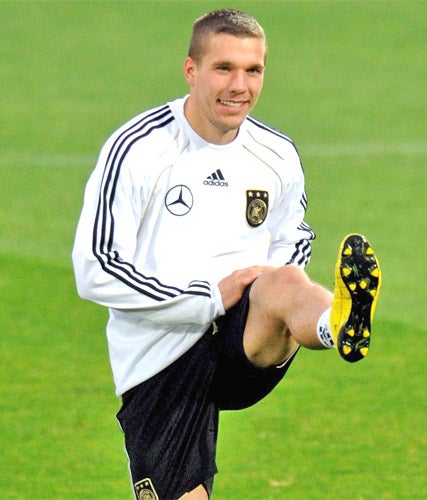Chris McGrath: Who are you calling Teutonic? How Podolski became the face of melting-pot Germany
World Cup Lives: Born in Silesia, he is the outsider who became a truly local hero

Even if they do not go on and win it, they have already succeeded – changing not just the way the world views their nation, but also how Germany looks at itself. A week ago, there were still aggrieved Englishmen incorrigibly proposing that the Germans owed their progress merely to Teutonic superiority in discipline and teamwork. After the performance against Argentina, however, even the Spanish must fear the dynamism of their opponents tonight.
As and when England discovers a young playmaker in the image of Mesut Ozil – but raised, say, from Pakistani stock in Dewsbury – perhaps then the team will find a path to the final stages of a World Cup. In the meantime Ozil, representing a third generation of Turkish immigrants, weaves together a German squad that famously includes players of Bosnian, Tunisian, Ghanaian, Brazilian, Nigerian, Spanish and Polish blood.
Make no mistake, ethnic integration in Germany has been an anguished affair. It has stoked residual fires of extremism. Even milder conservatives are outraged that Ozil murmurs verses from the Koran as they line up for the national anthem. In all this, however, there have been pathfinders – not least the prolific attacking partnership between Miroslav Klose and Lukas Podolski, both born in Poland.
Podolski is the outsider who became a truly local hero. Still only 25, he seems to have been around for a long time already, in every major championship since 2004. Born in industrial Silesia, he was two when his parents left for Bergheim, near Cologne. With a left foot that could break a dam from 50 yards, he was fast-tracked to a Bundesliga debut for Cologne in 2003, aged 18. The club was doomed to relegation, but Podolski scored 10 goals in 19 starts, and then spurred an immediate return to the elite with 24 the following season.
Cologne were promptly relegated again, however, and three World Cup goals on home soil in 2006 persuaded Bayern Munich that he was too good for the Second Division. The idea was to replicate his telepathy with Klose, but Podolski found himself increasingly on the margins after the arrival of Luca Toni. He continued to flourish in the national colours, admittedly, scoring both goals against Poland at Euro 2008 (and respectfully refusing to celebrate). But he betrayed his unhappiness when insolently slapping his captain, Michael Ballack, during a World Cup qualifier against Wales.
Back in Cologne, the campaign began to bring "Prinz Poldi" home. No German city has a more enduring sense of its own identity. Nowadays, however, 17 per cent of Cologne's population is of foreign extraction. As an immigrant himself, but a proud symbol of his adopted hometown, Podolski was an irresistible poster boy.
When it became clear that Bayern would end his purgatory, in return for the €10m (£8.3m) they had given for him, Cologne set up a 40,000-pixel image of Podolski on their website. Fans could buy a pixel for €25 apiece. Corporate sponsors bought up blocks to display their brands. Michael Schumacher bought €875 worth, writing: "Well, boy, you have followed your heart, and that's always good. Now you can show the fans what the club means to you."
And, so you would think, they all lived happily after. Unfortunately, the fairy-tale return has turned into a nightmare. Marooned in a flimsy team, Podolski gave an impression of culpable indolence and scored just three goals all season. Many were astonished when Joachim Löw persevered with Podolski in his World Cup squad – never mind in the starting XI. But while he compounded their fears by missing a penalty against Serbia, he had scored in the opener against Australia and then salvaged a maladroit first touch to do the same against England.
Against Argentina, he again had inept moments, but also made critical contributions to two goals. His own international tally is now 40 in 78 starts, a ratio that surely implies it cannot be too late for Podolski, in his athletic prime, to revive his club career. It is certainly conceivable his pace and power could, for instance, flourish in the sainted Premier League.
It would be a terrible shame if Podolski could not redress the disaster of his "homecoming". At the same time, equally, his story represents two sides of the same coin. No human owes his identity solely to his roots. And if Podolski discovers fulfilment somewhere other than Cologne, that would itself be a tribute to the demographic fluidities animating the great, unexpected adventure of Germany in South Africa.
Subscribe to Independent Premium to bookmark this article
Want to bookmark your favourite articles and stories to read or reference later? Start your Independent Premium subscription today.

Join our commenting forum
Join thought-provoking conversations, follow other Independent readers and see their replies